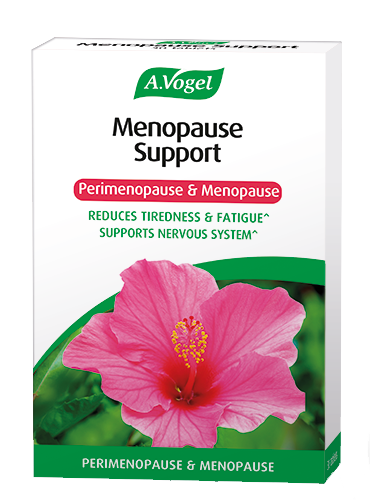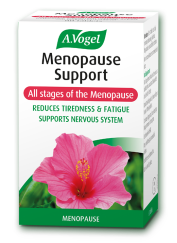Read the full video transcript below
Today's topic
Hello, and welcome to my weekly video blog. And today, on A.Vogel Talks Menopause, I am going to be talking about those awful mood swings.
Now, this is one of the common menopause symptoms, and a majority of women will get these at some point. Luckily, it tends not to be all the way through. You might find that this just lasts a few months, if you're absolutely lucky.
How you can feel
But it's a horrible one. It's actually really disconcerning, because you can wake up in the morning and just not know who you're going to be for that particular day. Are you going to be the nice, patient person, or are you going to be really impatient? Are you going to be calm, or are you going to be manic? Are you going to lose your temper, or are you going to be really nice and quiet? Are you going to be kind, or are you going to be really picky? And are you going to criticise everybody? Are you going to be diplomatic, or are you going to just let everything out, all the things that tend to annoy you on that particular day?
And all of these things can happen. And it is really horrible, because we don't know when these moods are going to strike. Very often, we don't know how to control them either. It's almost like our emotional control has gone completely out of hand.
So why does this actually happen?
Well, it's all to do with oestrogen. Oestrogen is your happy hormone. If you've got high levels of oestrogen, you're going to feel better, you're going to feel happier. And that's why when you're actually getting a monthly cycle, your oestrogen is at its highest, in the middle of the month, just when the egg is about to be released. And that's usually when women are the happiest as well.
So there's a big link between having good levels of oestrogen and feeling really good, and happy, and having a positive mood. The problem is in the menopause is that, when your oestrogen starts to fall, then you're going to lose that feel-good factor that your monthly boost of oestrogen is actually going to give you.
The other thing that can happen here is that some women don't actually realise that they're in a mood until somebody tells them. It's one of these weird things that when we're in the middle of it we're not actually aware of how we're behaving, we're not aware that we're behaving any differently. And then, of course, if somebody points it out to us that we're being a bit moody, or sulky, or huffy, well, you know, that can make things even worse than what they were before.
So it can be quite difficult to pinpoint this, and it is really sometimes about listening to what other people are saying and seeing how we're actually behaving.
So what can you do about the mood swings?
There's quite a few different things:
Balance your oestrogen levels
You could look at balancing your oestrogen level, so that would using remedies such as our Menopause Support or the herb black cohosh.
A.Vogel Menopause Support | For Perimenopause, Menopause & Postmenopause Symptoms
£8.99 (30 tabs) In Stock
Take magnesium – the happy mineral
We know magnesium can be an issue. Remember magnesium is our happy mineral. So if we're low in magnesium, that is going to affect our mood as well. So a nice daily magnesium supplement, maybe about 200 milligrams, can often be really helpful, and also go for those BVits (B vitamins) as well.
Avoid certain food & drinks
Things like tea, coffee, alcohol, high salt and sugar foods, these can make your moods swings worse. So be really, you know, careful about that one.
Keep a mood diary
Maybe if you can, if you are one of these women that realise that you are getting a bit moody and things are getting a bit out of hand, do the diary. Do a mood diary. And then you might find out that you tend to get these mood swings or your mood going up and down when you've not had something to eat, maybe you haven't had enough water for that particular day. It might be that you've forgotten to have a mid-morning snack.
So there's all sort of reasons, as well as the hormonal ones, why you can actually get these mood swings. So have a good look at what's going on in your daily life, and that might give you a little bit of a clue.
Blame your hormones
The really important thing here is, though, don't get mad at yourself if you find that your control is slipping and you end up snapping people's heads off, or getting impatient or a little bit angry. This is not anything to do with you. It's not your fault. This is a real physical hormonal imbalance going on. So just blame it all on your hormones. That's the easiest thing.
Talk about it
The other thing to do is tell those closest to you what's going on. Try and explain that your hormones are changing and that it's the hormones that are causing these mood swings and it's not you, it's not that you no longer care about them, but it's just the fact that this is a little phase you're going through. And if they are happy to support you, that's going to make you feel better as well, and it's going to speed up the whole process.
So, hopefully, that's given you a little bit of insight into those horrible mood swings. Remember the diary, and I will look forward to seeing you next week on A.Vogel Talks Menopause.









